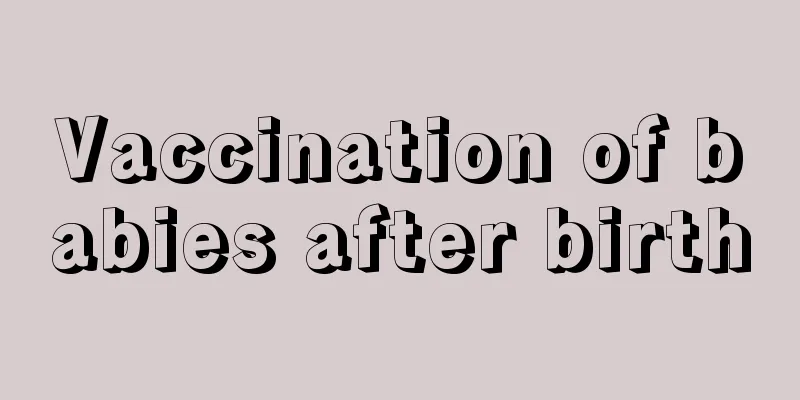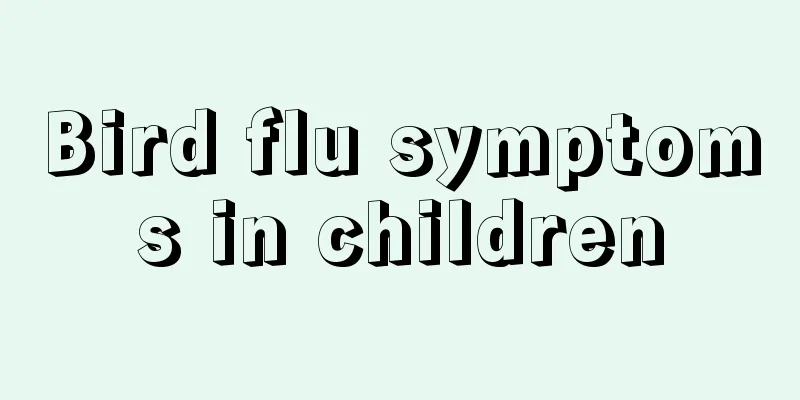Vaccination of babies after birth

|
Babies are given a variety of vaccinations shortly after they are born. There should be corresponding vaccines that need to be injected every month, and every baby's physical constitution is completely different, so the vaccination should take into account the child's own situation. After vaccination, pay attention to many common issues in life, such as bathing, diet, etc. Is it okay to vaccinate babies after they are born? 1. Live bacteria vaccine : After the toxicity of bacteria is artificially weakened, it is used as a vaccine. BCG, measles, polio, etc. belong to this category of vaccines. Because the bacteria are not completely killed, the body will have a slight infection after vaccination, and the resistance of blood and cells will also be improved. Therefore, after receiving this vaccine, immunity can last for a long time without the need for multiple booster immunizations. 2. Inactivated bacteria vaccine : The pathogens are killed artificially, leaving only the toxins. Such vaccines include influenza, whooping cough, and Japanese encephalitis, among others. This vaccine can form antibodies in the blood to kill invading pathogens. However, because inactivated bacteria vaccines lack growth potential, they need to be repeatedly administered to achieve the effect of strengthening the body's immunity. 3. Toxoids : Bacterial toxins are treated with formaldehyde to eliminate their toxicity but still retain their immunogenicity. Vaccines for diphtheria and tetanus are toxin vaccines. Although this type of vaccine is non-toxic, it is still immunogenic, so it can still stimulate the human body to produce antibodies to play an immune role. However, this type of vaccine, like inactivated bacteria vaccines, does not provide sustained immunity and requires repeated vaccination. Can newborns not be vaccinated? Vaccination is mandatory for newborns, especially Class I vaccines, which are those that can be given free of charge. Category I vaccines are vaccines included in the national plan, which prevent diseases with high incidence, high infectivity, high mortality or high disability rates. Therefore, for the health of newborns, it is necessary to strictly complete the vaccination of these Class I vaccines. Nowadays, after the baby is born, the new mother will receive a vaccination handbook issued by the hospital. The vaccines involved in it are Class I vaccines, which are mandatory requirements of the state and do not require out-of-pocket expenses. New mothers should take their babies for vaccination in a timely manner according to the requirements in the handbook. In addition to the vaccines in the plan, there are also Category II vaccines. There are no hard requirements for this type of vaccine and the cost is borne by the child, so you can choose to vaccinate according to the child's situation. If the baby has a poor constitution, he can be vaccinated with vaccines such as chickenpox, pneumonia, and influenza, because babies with poor constitutions are very susceptible to these diseases. Therefore, for the health of your baby, it is best to vaccinate him with some Class II vaccines as appropriate to eliminate the threat of disease. The role of newborn vaccinations 1. Reduce mother-to-child transmission rate Vaccines can stimulate the human body to produce corresponding immune capabilities, preventing such diseases from causing the body to have an excessive immune response, thereby protecting other parts of the body from harm. For example, after receiving the hepatitis B vaccine, the possibility of mother-to-child transmission can be effectively reduced, which also reduces the chance of the baby being infected with hepatitis B by the mother. 2. Prevent infectious diseases As children grow older, they will be vaccinated against polio, diphtheria, pertussis, measles, Japanese encephalitis, meningitis, and mumps-rubella vaccines. In addition, vaccines such as chickenpox and influenza type B are best chosen according to the child's immune capacity. It should be noted that after entering kindergarten, the baby will have more opportunities to contact the outside world, which greatly increases the chance of getting sick. Therefore, it is best to vaccinate the baby against highly infectious diseases such as chickenpox and hepatitis A before entering kindergarten. TIP: Vaccines actually simulate the invasion of pathogens, so if the vaccine is not destructive enough, it will not be able to get the attention of the body's immune function and will not be able to induce the body's immune response. Therefore, the most effective is the live attenuated vaccine, followed by the inactivated vaccine, and the component vaccine is the worst. Correspondingly, the live attenuated vaccine is the most dangerous, while the component vaccine is the safest. |
<<: What does the baby's five-in-one vaccine include?
>>: What to do if a 4-year-old has cavities?
Recommend
How old are the children?
June 1st of every year is designated as Children&...
What to eat for children with Tourette syndrome
Tourette syndrome is a relatively common disease ...
What happened to my daughter's face with a white spot?
Children are a high-risk group for white spots. T...
What to do if your child keeps coughing?
What to do if a child keeps coughing? Every paren...
How to relieve symptoms of endocrine disorders in children
Endocrine disorders will have different symptoms ...
What to do if your baby has a respiratory infection and fever
Babies have weak constitutions and will catch a c...
What causes acidic stool in babies?
If a baby has acidic stools, parents will definit...
What to do if your 6-year-old child has a hoarse voice
Children's vocal cords are relatively crisp a...
The child sweats on his head but not on his body
In fact, we don’t take sweating too seriously. Be...
What happens if a child has eye boogers?
Everyone has eye discharge, but some have more an...
What to eat for 5 month old baby
For parents, the most exciting thing is to witnes...
What is the normal temperature of a baby's forehead?
The health of the baby is a very important basic ...
What should I do if my five-year-old child keeps coughing?
When babies are very young, they often get sick b...
What to do if a child has short genitals
Many parents will find that their children’s geni...
What to do if baby has red bumps all over the body
When a baby is just born, all aspects of the baby...









